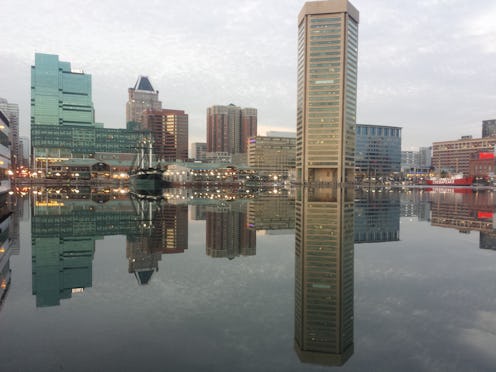News
All The #Baltimore Hashtags On Twitter
After several days of rioting, destruction, and violence in Baltimore, the city has mostly cooled down. But as usual, the Internet is just getting started. There are a lot of questions about media coverage of the events in Baltimore this week. What does the popular news media choose to cover? What priorities do news media coverage serve, and are those priorities served or undercut by the constant mini-reporting that thousands of citizens are doing 24/7 on Twitter, Tumblr, Instagram, and Vine? The differences between social media and news media are intertwining in a fascinating way this week. News channels use Baltimore hashtags on Twitter to publicize their broadcasts and get noticed, and Twitter users use the platform — especially hashtags — to point out problems with TV coverage of protests and riots.
Without hashtags, Twitter would be even more of a disorganized mess of opinions and information than it already is. The function of hashtags — a phrase I never thought I would write unironically — is actually to help compartmentalize the enormous amounts of information that are constantly streaming online. When I write an article about the riots in Baltimore, especially in the early phases when only a few people are documenting the events, I don't search the keyword "Baltimore" on Twitter. Just a keyword does not specify what information I am seeking. But the addition of the hashtag gives a word or phrase a whole new meaning. #Baltimore has a heavier meaning than Baltimore — #Baltimore is a social phenomenon. Here are some of the other hashtags people have been using as they take to Twitter to express what they are seeing and feeling.
#Baltimore
This is a catchall hashtag, one that carries meaning but is also safe for news networks to use without inviting controversy. For TV news channels' Twitter accounts, hashtags are used more as a way to get their coverage into the mix than to categorize information.
#BaltimoreRiots
Initially, this hashtag sparked anger from people who did not appreciate the characterization of the activity in Baltimore as riots. At first, the protests appeared peaceful. But even when it became apparent that the protests involved looting, violence, and destruction, some opposed to the term's use because it carried negative implications about a mass of people, which is never popular.
#BaltimoreUprising
A more empowered take on #BaltimoreRiots, this hashtag is used by people who are framing the events as a struggle against police brutality.
#blacklivesmatter
This hashtag has made a name for itself, perhaps one of the great hashtags of all time. It also carries quite a heavy meaning, as it originated in the wake of Michael Brown's death.
#FreddieGray
Freddie Gray's death while in police custody was the catalyst for a rekindled anti-police brutality movement in Baltimore, and destruction erupted after his funeral.
#JosephKent
As the Black Youth Project recently said, "Too many names have been turned into hashtags." On live TV, student and community activist Joseph Kent was taped peacefully protesting alone for Freddie Gray on the street in front of a multitude of cops. After a few moments, a SWAT car drove on the scene, and cops pushed Kent into the car, prompting a swath of anger online about how police had kidnapped an innocent man. It was later revealed that Kent was detained for breaking the citywide curfew.
#OneBaltimore
Lawmakers and activists are using this hashtag to emphasize the importance of peace and, most importantly, unity among residents to diminish violence.
